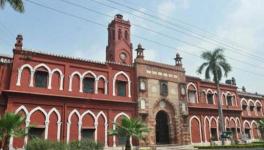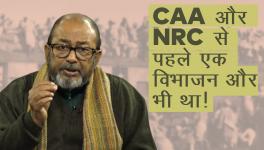Khwaja Altaf Husain Hali in Our Times
There are serious misconceptions in academic and popular circles about the role of Muslims in shaping India’s nationhood in the late 19th and early 20th centuries. These misconceptions bolster majoritarian accusations against Muslims, when it is a fact that all 19th century Indian reformists were unmistakably associated with religious particularism. Yet, the Muslim reformers, writers, and public intellectuals are often viewed as impediments to a “united” or composite nationalism.
For instance, Sir Syed Ahmad Khan, his companions, and their Aligarh Movement are identified as the sources of an eventual religious divide rather than as universalists, rationalists, and pluralists who opposed colonial plunder. Madan Mohan Malaviya, founder of the Banaras Hindu University, features more regularly in discussions on identity politics, while his engagement with economic affairs in the late 1930s and his marginalisation within the Hindu Mahasabha in the last decade of his life are ignored.
Writer Khwaja Altaf Husain Hali (1837-1914), a close companion of Syed, belonged to Panipat. He is often seen one who agreed with everything Syed said and did with regards to the colonial state, nationhood, caste and women education. However, this was not so. Reading Hali afresh would help correct some misconceptions about the Aligarh movement. His role in modernising literary criticism (Muqaddama-e-Sher-o-Shayeri) and his biographical writings on Sadi, Ghalib, etc, and his long reformist poems or musaddas are well-known beyond Urdu readers, yet he is often seen as no more than a follower of Syed.
Hali wrote against colonial plunder, caste-based and gender discrimination, and oppression of the peasantry. He had high expectations of the emerging middle-classes too, but these are lesser-known in Urdu literary circles and almost absent from historical and social-sciences.
Historian Partha Chatterjee identified three phases of nationalism in colonial India. The first was a “moment of departure” where, in the spiritual and cultural domains, the influence of western ideas was not very strong. He noted that the writings in Bangla of Bankim Chandra Chatterjee (1838-1894) were seen as a source of cultural self-confidence for the Indian literati and as having fostered anti-colonial mobilisation at the turn of the 20th century.
By comparison, the Urdu writings of Muslim intellectuals were neglected, though in his 2005 book, Moral Reckoning: Muslim Intellectuals in 19th Century Delhi, Mushirul Hasan made a welcome intervention. There is also the Urdu monograph, Hali Ka Siyasi Sha’oor (Hali’s Political Consciousness), the Ph.D. thesis of the famous Urdu poet Moin Ahsan Jazbi (1912-2005) published in the 1950s, which throws light on the nature of nationalism and how Muslims shaped it.
Hali was born in a lower-middle-class zamindar family in Panipat and came in contact with Mustafa Khan Shaifta (1809-1869) in Delhi in 1868. After 1857, half of Shaifta’s landholdings had been confiscated by the British, who also incarcerated him. He harboured deep anguish against the Raj and Hali probably inherited his anti-British feelings.
In 1872, after Shaifta’s death, Hali moved to Lahore to work for the Punjab Government Book Depot. He encountered Urdu translations of English-language works there. In 1874, Mohammad Husain Azad (1830-1910) launched a new style of poets’ assemblies known as mushaira. Poets would compose poems that encouraged rationalism and the scientific temper using Indian cultural and geographical imageries.
Hali composed four important long poems in these mushairas, including Nishat-e-Ummeed (Joy of Hope). It was around this time that Sir Syed wrote the allegorical prose, Ummeed ki Khushi, a testament to his struggle for hope amidst the despair of colonisation. In Hubb-e-Watan (Love for the Homeland) and Munazera-e-Rahm-o-Insaf (Debate between Compassion and Justice), Hali dramatised debates through personified human qualities.
Hali’s poetry was universal in appeal. He did not reach out Muslims alone. His works hinted at the massacres after 1857, although cautiously, and underlined the ravages of famines, hunger, poverty, lack of education, and other deprivations of colonial exploitation. He pins his hopes on the affluent and educated segments, to whose miserliness and self-centrism he attributes these problems.
He speaks out against caste-based oppression and hierarchy and condemns the Syeds and Brahmins for subjugating the Sudras. Hali calls shedding such hierarchies Hubb-e-Watan or Love for the Homeland, and Qaumi Khidmat or service to the nation. His “qaum” refers to all Indians, not Muslims alone.
In poems composed for the public mushairas of Lahore, Hali extols rationalism and makes distinctions between pre-colonial and colonial governance. He disdains the authoritarianism of the pre-colonial era and welcomes some theoretical features of colonial governance such as the rule of law, freedom of the press and legislative councils. In one long essay, he holds forth on journalistic ethics. Later, he accentuated the disjunction between the theory and practice of the “regenerative” features of colonial governance. He was, for example, skeptical about the Queen’s Proclamation of 1858 that declared “equality before the law” in India.
Hali is less ambiguous in his critiques than Syed. He was also twenty years younger, and wrote for 16 years after Syed’s death. Of course, literature from the last seven years has recorded even Syed’s unambiguous critiques of colonial plunder and racism.
Could not we say—as critics of the current regime do—that there is a disjunction between its proclamations like “Sabka Saath, Sabka Vikas, Sabka Vishwas” and the exclusion, discrimination and oppression in practice? The disabling citizenship laws and inaction against and patronage to the cow vigilantes would stress this feature.
Some who are either innocent or self-centered look upon such deceptive slogans with hope and trust. Hali offers an eye-opener of a poem with these lines:
Dard aur dard ki hai sab ke dawa ek hi shakhs/
Yaan hai jallad o maseeha ba khuda ek hi shakhs/
Qaafiley guzrey wahan kyon kar salamat waaiz/
Ho jahan raahzan aur raahnima ek hi shakhs...
[The one who inflicts the wound claims to offer the ointment too/ Where both oppressor and saviour are one and the same/ How can the caravan be safe there of defenders of the regime/ Which is both leader and plunderer of the caravan.]
Thus, Hali’s essay (1871) on assessing the Syed’s efforts, his anti-colonial, patriotic poems at Lahore (1872-1875), his musaddas, his scientific enquiry into history remained intact. His sole concern was to persuade a colonised society to introspect, take pride in its culture and draw upon its sources of self-confidence and strength.
In July 1895, Hali wrote an essay for the magazine of MAO College Aligarh, reflecting on why and how Indian Muslims became so incapacitated as to be unable to work for emancipation? He asked why they have stagnated and failed to create a progressive, educated, professionally trained middle class. He analyses the debilitating impact of Asian forms of autocratic governance that are based on the cult of personality.
His arguments in his poems and essays specifically need re-reading today. Keeping in mind the location of Muslims in the current majoritarian regime may help grasp Hali’s arguments more clearly. He distinguishes between two kinds of subjugated people. One, a group which psychologically identifies with the ruling classes, and the other that feels excluded from the governing classes.
It was his view that authoritarian regimes tend to incapacitate the subjugated and excluded, who eventually feel helpless. They just lose interest in governance and statecraft, and intellectually and psychologically stagnate and degenerate. The elites within those who identify with the ruling class feel content with doles, favours, jobs and sinecures. They sacrifice their self-respect and desert all concerns of socio-religious and economic reforms. They thus lose self-confidence and eventually exhaust their potential to uplift the deprived among their fellow countrymen.
The excluded, on the other hand, tend to develop a spirit of self-help and prefer not to depend on government services as much as on developing their own craft, skill, trade, agrarian work, and other independent professions. Essentially, Hali seems to put the post-Mughal Muslim elites in the category of those who have compromised. Such people tend to become more superstitious and fatalist. Taqdeer ka parastaar aur tadbeer se kinarakashi, diagnoses his poem, Shikwa-e-Hind or India’s complaints.
A more frank exposition of the moral degeneration of Muslim elites is to be found in his essay, Tijarat ka Asar Aql-o-Akhlaq Par, or The Impact of the Trading Profession On Wisdom and Morality). He argues that Muslim elites depend more on government jobs and less on trade, but the latter is a profession that requires modest behaviour, polite conversation, and a spirit adventurous enough to take risks.
Hali suggests that without economic uplift, no community can sustain a project of social reforms. His poem, Ta’assub wa Insaf strongly disapproves ta’assub (prejudice), the enemy of individual and society. He says insaf (justice) is the antidote for ta’assub, but rationalism is a necessary prerequisite. Without rationalism, nobody can attain insaniyat (humanism) and wasi’-un-nazri (broadmindedness). He insists on these in his address to the educational conference as well, where he argues that the Arya Samaj could sustain and expand its projects because trading communities supported it.
Ahsan Jazbi pleads for appreciation of the political insights of Hali pertaining to what Karl Marx had also said—there are degenerative and regenerative aspects (taareek aur raushan pehlu) of British colonialism in India. While Syed mostly pointed out the regenerative aspects, Hali was more inclined to expose and critique the degenerative aspects.
Hali’s essays reveal the truth about the colonial political economy: how industrially-advanced metropolitan countries were subjugating Asia and Africa to exploit their natural resources, how they plunder and massacre, and shatter the administrations, peace and justice in these continents. He asserts that the doctrine of free-trade is in the interest of England, and cannot ever dispense justice to a colonised people. His prose—essays and prefatory notes to poems—elaborate his thoughts on colonists ravaging the economy, culture, education and every other aspect of the colonised lands. His poems, Tuhfat-ul-Ikhwan (Gift to Brothers) and Dehli Ka Jalsa-e-Conference illustrate this strongly.
On the gender issue too, Hali was a critic of the purdah sytem. His poems, Munajat-e-Bewah, and Chup ki Daad (1905) are known for exposing the subjugation of aristocratic Muslim women. He advocated modern education for women even more strongly than he opposed purdah. At times, like many colonial-era reformists, he seems to contradict himself, and Jazbi accuses him of not being brave enough. His cautiousness are an oblique signal to Sir Syed as well, which expresses itself in the poem Reform Ki Had (Limit of Reform) in particular.
In terms of modern education, Jazbi’s assessment is that Hali emphasised technical training more than Syed. This appraisal needs to be re-evaluated, though. There are enough writings of Syed—though later in life—that support specialised education to operated domestic and international trade and for industrial training and research. Hali had a clear vision of the objectives of a university. He did not wish for a degree-mill that produces clerks (karkhana-e-clerksaazi) who are obedient to the state. Rather, graduates should be the thinking people. In his interrogative essay, Hum Jeetey Hain Ya Mar Gaye? (Are we dead or alive?), he insists on acquiring skills and education for self-help and for independent professions (azad pesha), including trade and agriculture. Hali did not expect much from the affluent or religious scholars. The former were self-centered and immoral consumerists, while he found the latter were just inward-looking.
He asked the middle classes not only to be talkers but also do-ers and role models worthy of emulation. He said the pen-pushers and the middle classes should do more than hate-filled, scornful criticism and condemnation.
In his poem, Qaum Ka Mutawassat Tabqa and its long introductory essay, he persuades the middle classes to create and expand itself. He pins more hopes on this section to care for the poor, illiterate and downtrodden.
In a letter sent in 1904 to playwright and essayist Abdul Halim Sharar, Hali expresses concern about growing Hindu-Muslim tensions and the colonial role in exacerbating it—best articulated in his poem Tadbeer-e-Qayam-e-Sultanat. Yet, he was strongly hopeful that with meaningful rational education, the two communities will work out how to live in amity and peace.
This letter subsequently resonated in WC Smith’s 1946 book, Modern Islam in India: A Social Analysis and Jawaharlal Nehru’s book, The Discovery of India, published the same year. Smith and Nehru explain the growing communal conflicts through the “lag theory”, according to which an educated and modern Muslim middle class was created after almost half-a-century’s delay. Indeed, there was a precisely fifty-year gap between the setting up of the Brahmo Samaj and the MAO College, Aligarh.
In 1880, Hali wrote Kya Musalman Taraqqi Kar Saktey Hain?, raising the same question. In another essay from July 1895 he persuades Muslims to develop their capacity through independent professions rather than government service. His poems, Ba Nang-e-Khidmat (1887) and Falsafa-e-Taraqqi are of particular importance. Hali was therefore a strong advocate of the economic boycott proposed by the Swadeshi Movement to oppose the Partition of Bengal along communal lines in 1905. He wrote a long essay endorsing the agitation and insisted on shaking the financial foundations of the Raj, which, he believed, would pave way for equality of economic opportunities for all Indians.
In the difficult times we inhabit, revisiting public intellectuals of the past is instructive. Jazbi’s study of Altaf Husain Hali should be fully translated into English, Hindi and all Indian languages. That is how we can pave the way to erect people’s solidarities for a better, equitable, and prosperous India.
Get the latest reports & analysis with people's perspective on Protests, movements & deep analytical videos, discussions of the current affairs in your Telegram app. Subscribe to NewsClick's Telegram channel & get Real-Time updates on stories, as they get published on our website.

















